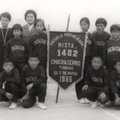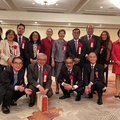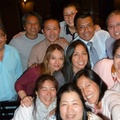Part 1 >>
Nikkei Identity
Kaori was raised by her grandmother in a Japanese environment. “Our relationship within our Japanese home was one of constant silence; it took just a simple stare of disapproval to know that I did something wrong. My grandmother did not have to say anything for me to run away. This kind of Japanese behavior is a sign of environment rather than verbal rules,” she recalled.
Just like any typical Japanese home, you are taught by example, not with words. Kaori knew how she was supposed to behave, what was considered correct and proper by observing her grandmother. There was no need to talk.
At times we shared things in silence. “Do you know what I used to do with my grandmother? I watched Japanese movies—we didn’t say much, only watched—sumo wrestling, and Japanese pop music entertainers on tape,” Kaori reveals.
Her grandmother’s silence even extended into the past. Kaori knew that her grandparents had lived in Peru because one of her aunts was born there, but that’s all she knows about it.
“My family is one of those typical Japanese families that doesn’t talk about what happened in the past because it is painful, or because it brings bad luck, etc. There was never an oral history in my family,” she explains. According to Kaori’s mother and in the same vein as her obaachan, or grandmother, she didn’t enjoy talking about the past because “life was so difficult in Peru…she said they were very poor, which she didn’t want to talk about, that the present is much better, that we are all fine.”
Her grandmother arrived in Peru when Rinzo went looking to get married. She left with her family the money that she had set aside for the trip, and cleaned the ship in order to pay for the voyage.
Kaori’s Japanese ancestry has caused her problems ever since childhood. “It bothered me a lot that my classmates would make fun. If a television commercial appeared with a Chinese person, the very next day the kids would tease me. This bothered me until one day I realized—after my parents had me change schools on several occasions—that I needed a little attention, even teasing, because it was important to me. My brother, on the other hand, ended up in fights.
I never had any identity conflicts, however. Her father played an important role here. “My dad helped me a lot with this, because he always told me ‘Don’t say you are Kaori Flores, rather tell everyone you are Kaori Flores Yonekura; always include your Japanese surname, which is very important.’ My dad always placed great importance on my Japanese identity; in fact, it was he who pushed me to take Japanese language classes. My Venezuelan dad encouraged me more than my Japanese family,” Kaori states.
Before embarking on her documentary, Kaori rarely thought out her Nikkei identity. Now she is two years into researching it. An interview with the Peruvian writer Augusto Higa opened her mind. “I really enjoyed hearing what he had to say; he said something in the interview that I am still trying to grasp, that the word Nikkei comes from outside of Japan. We invented the concept of Nikkei—we who are floating between land and ancestral heritage in search of a home,” she says.
Kaori adds: “I have to embrace an identity to avoid uncertainty. I am neither Japanese nor completely Venezuelan; rather, I am Nikkei. It was at that moment that I understood that to be Nikkei is to be between the land of your birth and your heritage. I believe it’s o.k. to say ‘I am Nikkei’ because you are part of something.”
* This article is made possible by an agreement between the Japanese Peruvian Association and the Discover Nikkei Project. It first appeared in the journal Kaikan, volume 47, July 2010.
© 2010 Asociación Peruano Japonesa y Enrique Higa Sakuda / © 2010 Fotos: Asociación Peruano Japonesa y Kaori Flores Yonekura










